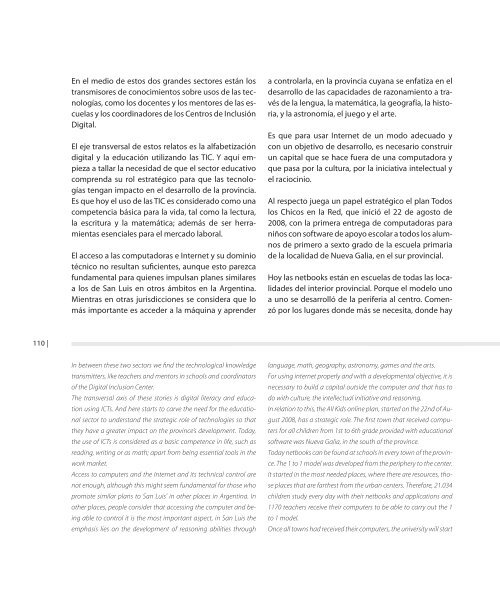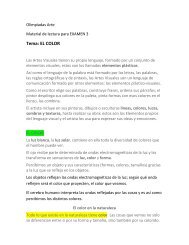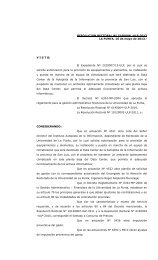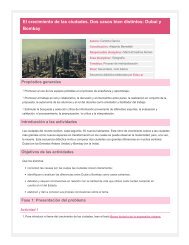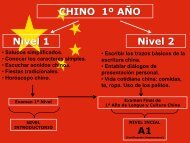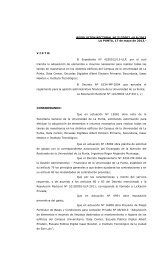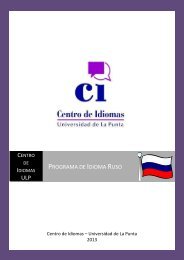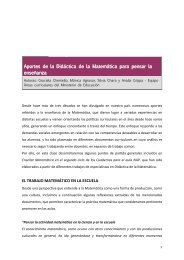En el medio <strong>de</strong> estos dos gran<strong>de</strong>s sectores están lostransmisores <strong>de</strong> conocimientos sobre usos <strong>de</strong> las tecnologías,como los docentes y los mentores <strong>de</strong> las escuelasy los coordinadores <strong>de</strong> los Centros <strong>de</strong> InclusiónDigital.El eje transversal <strong>de</strong> estos relatos es la alfabetizacióndigital y la educación utilizando las TIC. Y aquí empiezaa tallar la necesidad <strong>de</strong> que el sector educativocomprenda su rol estratégico para que las tecnologíastengan impacto en el <strong>de</strong>sarrollo <strong>de</strong> la provincia.Es que hoy el uso <strong>de</strong> las TIC es consi<strong>de</strong>rado como unacompetencia básica para la vida, tal como la lectura,la escritura y la matemática; a<strong>de</strong>más <strong>de</strong> ser herramientasesenciales para el mercado laboral.El acceso a las computadoras e Internet y su dominiotécnico no resultan suficientes, aunque esto parezcafundamental para quienes impulsan planes similaresa los <strong>de</strong> San Luis en otros ámbitos en la Argentina.Mientras en otras jurisdicciones se consi<strong>de</strong>ra que lomás importante es acce<strong>de</strong>r a la máquina y apren<strong>de</strong>ra controlarla, en la provincia cuyana se enfatiza en el<strong>de</strong>sarrollo <strong>de</strong> las capacida<strong>de</strong>s <strong>de</strong> razonamiento a través<strong>de</strong> la lengua, la matemática, la geografía, la historia,y la astronomía, el juego y el arte.Es que para usar Internet <strong>de</strong> un modo a<strong>de</strong>cuado ycon un objetivo <strong>de</strong> <strong>de</strong>sarrollo, es necesario construirun capital que se hace fuera <strong>de</strong> una computadora yque pasa por la cultura, por la iniciativa intelectual yel raciocinio.Al respecto juega un papel estratégico el plan Todoslos Chicos en la Red, que inició el 22 <strong>de</strong> agosto <strong>de</strong>2008, con la primera entrega <strong>de</strong> computadoras paraniños con software <strong>de</strong> apoyo escolar a todos los alumnos<strong>de</strong> primero a sexto grado <strong>de</strong> la escuela primaria<strong>de</strong> la localidad <strong>de</strong> Nueva Galia, en el sur provincial.Hoy las netbooks están en escuelas <strong>de</strong> todas las localida<strong>de</strong>s<strong>de</strong>l interior provincial. Porque el mo<strong>de</strong>lo unoa uno se <strong>de</strong>sarrolló <strong>de</strong> la periferia al centro. Comenzópor los lugares don<strong>de</strong> más se necesita, don<strong>de</strong> hay110 |In between these two sectors we find the technological knowledgetransmitters, like teachers and mentors in schools and coordinatorsof the Digital Inclusion Center.The transversal axis of these stories is digital literacy and educationusing ICTs. And here starts to carve the need for the educationalsector to un<strong>de</strong>rstand the strategic role of technologies so thatthey have a greater impact on the province’s <strong>de</strong>velopment. Today,the use of ICTs is consi<strong>de</strong>red as a basic competence in life, such asreading, writing or as math; apart from being essential tools in thework market.Access to computers and the Internet and its technical control arenot enough, although this might seem fundamental for those whopromote similar plans to San Luis’ in other places in Argentina. Inother places, people consi<strong>de</strong>r that accessing the computer and beingable to control it is the most important aspect, in San Luis theemphasis lies on the <strong>de</strong>velopment of reasoning abilities throughlanguage, math, geography, astronomy, games and the arts.For using internet properly and with a <strong>de</strong>velopmental objective, it isnecessary to build a capital outsi<strong>de</strong> the computer and that has todo with culture, the intellectual initiative and reasoning.In relation to this, the All Kids online plan, started on the 22nd of August2008, has a strategic role. The first town that received computersfor all children from 1st to 6th gra<strong>de</strong> provi<strong>de</strong>d with educationalsoftware was Nueva Galia, in the south of the province.Today netbooks can be found at schools in every town of the province.The 1 to 1 mo<strong>de</strong>l was <strong>de</strong>veloped from the periphery to the center.It started in the most nee<strong>de</strong>d places, where there are resources, thoseplaces that are farthest from the urban centers. Therefore, 21.034children study every day with their netbooks and applications and1170 teachers receive their computers to be able to carry out the 1to 1 mo<strong>de</strong>l.Once all towns had received their computers, the university will start
menos recursos, los más alejados <strong>de</strong> los centros urbanos.De ese modo, 21.034 chicos estudian cada díacon sus netbooks y <strong>de</strong>más aplicaciones, y los acompañan1.170 maestros <strong>de</strong> grado que recibieron susnotebooks para llevar a<strong>de</strong>lante el mo<strong>de</strong>lo. Ahora, unavez completado el interior la <strong>ULP</strong> encarará la entrega<strong>de</strong> netbooks y la implementación <strong>de</strong>l mo<strong>de</strong>lo en VillaMerce<strong>de</strong>s y San Luis, las dos principales ciuda<strong>de</strong>s <strong>de</strong>la provincia.A<strong>de</strong>más <strong>de</strong> mejorar el nivel <strong>de</strong> aprendizaje <strong>de</strong> losalumnos <strong>de</strong> primaria a partir <strong>de</strong> los contenidos especificadospor el Ministerio <strong>de</strong> Educación <strong>de</strong> la provincia,el plan tiene como objetivos la difusión <strong>de</strong>l uso<strong>de</strong> las TIC en la comunidad <strong>de</strong> alumnos <strong>de</strong> enseñanzaprimaria con el fin <strong>de</strong> alfabetizarlos e incluirlos digitalmentea través <strong>de</strong> conocimientos útiles que tenganimpacto en sus activida<strong>de</strong>s escolares diarias.El proyecto también busca incluir a los alumnos enel aprovechamiento <strong>de</strong> las TIC en la actividad escolardiaria; permitir la inclusión social digital y el <strong>de</strong>sarrollo<strong>de</strong> la sociedad <strong>de</strong>l conocimiento; e impulsary generar el pensamiento en red para promover el<strong>de</strong>sarrollo sustentable a través <strong>de</strong> las TIC y su impactoen la comunidad. El proyecto es financiado íntegramentepor el Gobierno provincial.Para la entrega <strong>de</strong> las netbooks se firma un acta <strong>de</strong>responsabilidad con el tutor <strong>de</strong>l alumno don<strong>de</strong> se locompromete a darle un fin educativo al equipo. <strong>La</strong>computadora es propiedad <strong>de</strong>l alumno y sólo se leexige <strong>de</strong>volverla en el caso <strong>de</strong> que el niño cambie sudomicilio, o si se muda fuera <strong>de</strong> San Luis, o se cambiaa una escuela que no está comprendida en el proyecto.Pero no sólo <strong>de</strong> hardware vive la herramienta tecnológicainsertada en este proceso educativo, sino <strong>de</strong>software. El portal Aula 1 a 1 es el soporte digital quela <strong>Universidad</strong> <strong>de</strong> <strong>La</strong> <strong>Punta</strong> instala en las computadorasutilizadas por los alumnos y los docentes queparticipan <strong>de</strong>l plan, y que usan las personas que completansu escolaridad en los CID.| 111implementing the mo<strong>de</strong>l in Villa Merce<strong>de</strong>s and San Luis, the two largestcities, by handing in computers to stu<strong>de</strong>nts.Besi<strong>de</strong>s improving the learning level of primary school stu<strong>de</strong>ntsfrom the contents specified by the provincial Ministry of Education,the plan has as one objective the spreading of the use of ICTs in primaryschool stu<strong>de</strong>nts’ community so as to teach them and digitallyinclu<strong>de</strong> them through useful knowledge that has impact on theirdaily school activities.The project also tries to inclu<strong>de</strong> stu<strong>de</strong>nts in the benefits of the ICTs intheir daily school activity; allowing the social digital inclusion andthe <strong>de</strong>velopment of the Knowledge society; and fostering and generatinga network thinking to promote sustainable <strong>de</strong>velopmentthough the ICTs and their impact on the community. The project istotally financed by the provincial Government.When netbooks are han<strong>de</strong>d in, an agreement is signed by the child’stutor where he accepts to use the computer with educational purposesonly. The computer belongs to the stu<strong>de</strong>nts and he/she wouldhave to give it back only if he/she moves to another province, or ifhe/she changes school and goes to a school that is not inclu<strong>de</strong>d inthe plan.But this technological tool is not just hardware, there is softwareinvolved as well, in this educational process. Classroom 1 to 1 is thedigital support that the University installs in all computers used bystu<strong>de</strong>nts and teachers who are part of the plan, and in computersused by those people who are finishing their schooling at the DigitalInclusion Center.This software <strong>de</strong>veloped by Competir.com, a national companywith offices in <strong>La</strong> <strong>Punta</strong> Informatics Park, offers material for differentsubjects like language, math, Social sciences and natural sciencesand contains educational contents for primary and secondary levelas well as material for teachers.In or<strong>de</strong>r to access this program, you just need to enter the site www.
- Page 3 and 4:
»InitiativesHistorias de San Luis
- Page 5:
»Historiasde San Luis DigitalIniti
- Page 8 and 9:
Con estos antecedentes y una serie
- Page 10 and 11:
El Gobierno de San Luis previó est
- Page 13:
»ÍndiceIntroducciónCapítulo I -
- Page 16 and 17:
14 |Campus Universidad de La Punta
- Page 18 and 19:
El presente libro registra voces de
- Page 20 and 21:
Escuela provincial N° 192 “Maest
- Page 22 and 23:
producciones de alfa, omega, epsil
- Page 24 and 25:
piden la proyección de películas
- Page 26 and 27:
para llegar a Buenos Aires y estar
- Page 28 and 29:
en una fábrica. Ahora, con la ‘c
- Page 30 and 31:
de cada provincia. La de San Luis v
- Page 32 and 33:
A diferencia de la escuela de Donov
- Page 34 and 35:
Escuela Nº 267 “Gobernador Eribe
- Page 36 and 37:
Esta docente también dicta clases
- Page 38 and 39:
Escuela Nº 267 “Gobernador Eribe
- Page 40 and 41:
“Los chicos ya saben más que yo
- Page 42 and 43:
“Cada docente tiene libertad para
- Page 44 and 45:
para que los chicos puedan hacer tr
- Page 46 and 47:
más de contemplar la meta de ofrec
- Page 48 and 49:
en un horario preacordado en forma
- Page 50 and 51:
mera obligación, terminará, y ent
- Page 52 and 53:
1º del Polimodal (hoy 3º año)”
- Page 54 and 55:
comenzar a trabajar rápidamente. D
- Page 56 and 57:
y trabajando en Piedra Bola y viaja
- Page 58 and 59:
distancia no existe porque todo va
- Page 60 and 61:
des que, sin rodeos, relata: “Est
- Page 62 and 63: e cómo buscar más material cuando
- Page 64 and 65: Plan de Inclusión Social (plan soc
- Page 66 and 67: Centro de Inclusión Digital de El
- Page 68 and 69: Claro que lo que sucede en el marco
- Page 70 and 71: signas”, pero busca superar esas
- Page 72 and 73: situación de vida, se atrevieron a
- Page 74 and 75: porque dicen que, así, no me quedo
- Page 76 and 77: La introducción de herramientas di
- Page 78 and 79: “Trabajamos con los profesores, c
- Page 80 and 81: su compresión más sencilla. Se tr
- Page 83 and 84: »Capítulo IVTalleres de arte, jue
- Page 85 and 86: Escuela 145 “Patricio Guanca” /
- Page 87 and 88: alcanzar un objetivo les impide pro
- Page 89 and 90: Natalia Miranda (12) es otra de las
- Page 91: tengan mejores condiciones de vida,
- Page 94 and 95: mas libres que, cuando terminan de
- Page 96 and 97: La aspiración de Ester es “apren
- Page 98: “Hace un año y medio que estoy e
- Page 101 and 102: tra pero dejé para poder dedicarme
- Page 103: en computadoras y arrancó con inge
- Page 106 and 107: otra vez, que es el típico hospita
- Page 108 and 109: Policlínico Regional de San Luis /
- Page 110 and 111: Desde una habitación vecina, Lucas
- Page 114 and 115: 112 |22 de agosto de 2008 - Entrega
- Page 116 and 117: plementa con servicios gratuitos de
- Page 119 and 120: »Capítulo XIConcluciones“Yo ten
- Page 121 and 122: Oportunidad y cambio son dos palabr


